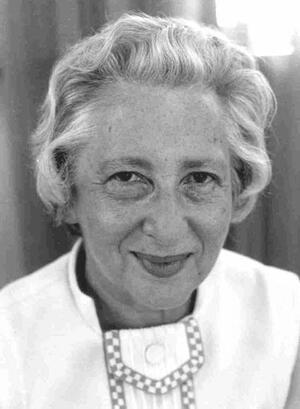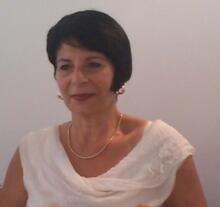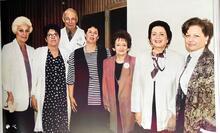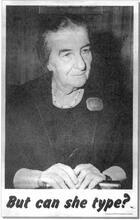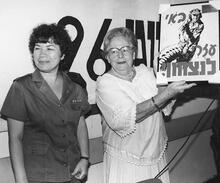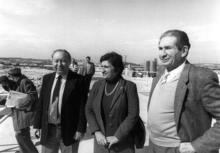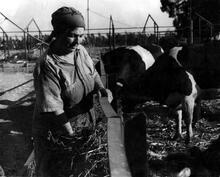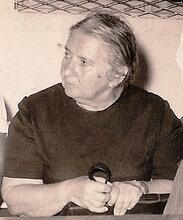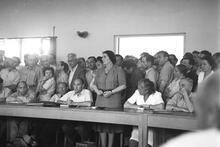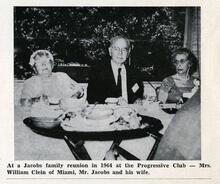Zena Harman
Zena Harman completed her degree in international law and relations at the London School of Economics in 1935. After she and Abe Harman married in 1940 in South Africa, the couple proceeded to Palestine. Zena managed the Jerusalem Jewish community’s social services in the early 1940s, served in Youth Aliyah, and joined the Israeli foreign service. In 1950, the Harmans were posted to the Israeli delegation to the United Nations, where Zena served eventually as rapporteur of the Economic and Social Committee. In 1955, she became the first woman to head a division of the Israeli Ministry of Foreign Affairs. When Avraham became Israeli ambassador to Washington, Zena represented Israel on the board of UNICEF. In 1969 she was elected to the Knesset; after her retirement, she helped found and served on the boards of a variety of social welfare, women's, and civic initiatives and served as special correspondent of the UN High Commissioner for Refugees in Israel.
In her warm, intelligent and humble way, Zena Harman did more to lay the foundations for Israel’s advanced social services and to pave the way for the country’s integration into the international community than almost any other person of her generation. Wise, unassuming, and genuinely devoted to the values of personal dignity, equality, and social justice, her extraordinary and often undervalued legacy is matched—for those who were privileged to know her—only by her incredible humanity.
Education, Early Career, and Marriage
Zena (nee Stern) was born in London on April 14, 2014, to Solly Stern, a clerk, and Clara Horowitz Stern, a homemaker. She had one sister, Sylvia. Zena was educated in London, completing a B.Sc. Econ. in international law and relations at the London School of Economics and Political Science in 1935. During her university years she met Abba Eban from Cambridge and her future husband, Avraham (Abe) Harman (then Herman) from Oxford—both ardent Zionists who tried to draw the young student from an assimilationist background into their activist circle. Although her relationship with Abe burgeoned, Zena remained somewhat skeptical about Zionism. Upon graduation she started a career in advertising with Unilever. However, when the situation of Jews in Europe deteriorated, she decided to take up a position with the Jewish Association for the Protection of Girls and Women, where she gained her first experience in social work (supplemented by studies in sociology at Morley College). Abe, in the meantime, had immigrated to Palestine and started work in the political division of the Jewish Agency, before being dispatched to South Africa as an emissary for the fledgling Zionist movement.
The outbreak of World War II found Zena in London, where she accepted Abe Herman’s proposal of marriage in 1939. She embarked on a ship to Cape Town and, in January 1940, the couple were married. Immediately after the wedding the newlyweds left for Palestine, arriving several weeks later via the East Coast of Africa, the Horn and Egypt.
For the next fifty-two years Zena and Abe’s professional and personal lives were closely intertwined. Zena pursued her own career in public service, but also accompanied Abe on his many missions and provided a warm environment for family and friends. For many years she simply did what feminists later preached.
Work in Social Services, Child Welfare, and Foreign Affairs
This pattern first became apparent when the couple settled in Jerusalem in 1940: Abe continued his political work under Moshe Sharett (Shertok) at the Jewish Agency and Zena took up a position as head of the Children’s Social Services in the Jewish Community Council of Jerusalem (1941–1943). In 1943 she moved to Youth Aliyah (the Child Rescue Movement), working closely with Henrietta Szold until 1949 on saving thousands of young Jews from war-torn Europe. During this period, she gave birth to her first two children, David Harman (b.1944) and Naomi Harman Chazan (b. 1946).
Immediately after Israel’s independence in 1948, Zena and Abe (who had by then Hebraized their surname to Harman) were among the core group of Oxbridge-educated professionals who helped to establish the Ministry of Foreign Affairs. Avraham Harman was dispatched to become Israel's first Consul-General in Montreal, where their third child, Ilana Harman-Boehm was born in 1949. In 1951 Abe became Israel’s Consul-General in New York. At the same time, Zena was appointed to the permanent delegation of Israel to the United Nations, where she served for five years (1950–1955) as Israel’s representative on the Economic and Social Committee (and ultimately as rapporteur of the Third Committee), further honing her expertise in social justice, children's rights, and refugee affairs.
The Harmans returned to Jerusalem in 1955, Zena first to the Department of Technical Assistance in the Prime Minister’s Office and then back to the Ministry of Foreign Affairs (where she became the Director of the Division for International Organizations—the first woman to achieve this rank), and Abe to head the Information Division of the Jewish Agency. In 1959 Abe was appointed Israeli ambassador to the United States (1959–1968) and the family moved to Washington, D.C. During this period Zena Harman continued to work not only as the wife of the ambassador (itself a full-time job), but also as an ambassador in her own right. She served as Israel’s representative to UNICEF between 1960 and 1968, was elected to head the Program Committee for seven consecutive terms, and then to chair the Executive Board of UNICEF for one term—the highest elected position within the international organization achieved by any Israeli until the 1990s. In her capacity as Chairperson, she received the Nobel Peace Prize on behalf of UNICEF in 1965.
By the late 1960s, when the Harmans returned to Jerusalem (Abe was appointed President of the Hebrew University in 1968, a position he retained until 1983, at which point he became Chancellor), the three children had already left home. Zena, who was looking for new challenges, acceded to Golda Meir’s proposal to run for the Knesset on behalf of the Labor party (known at the time as the Alignment). She had hoped that she could apply the international experience gained at the cutting edge of welfare policy to the Israeli situation and, indeed, pioneered the introduction of parliamentary bureaus to better serve the needs of her constituents. One term in the Knesset (1969–1974), however, convinced her that she would have a greater impact (and be far happier) outside the rough and tumble parliament which was so alien to her disposition. She decided not to run for a second term.
Honorary Correspondent of the United Nations High Commissioner for Refugees
In the mid-1970s, although formally retired, Zena Harman embarked on the third phase of her career, which lasted for another twenty-five years. From 1976 to 1997 she served as honorary correspondent of the United Nations High Commissioner for Refugees in Israel, handling all requests for refugee status and petitions for asylum. At the same time, she further immersed herself in Israeli social issues, sitting on multiple committees, commissions, and boards, ranging from the executive of the Israel Broadcasting Authority, the Prime Minister’s Committee on Children and Youth, the National Board for Community Centers, the Governing Board of the National Insurance Institute, the Prime Minister’s Commission on the Status of Women, the Witkon Commission on Social Work and the Kohn Commission on Probation. She also chaired the Demographic Council at the Prime Minister’s Office (1968–1980), the Advisory Board of the Hadassah Community College (1970–1978), the Israel National Committee for UNICEF (1976–1987), the Presidential Conference on Children and Youth (1984), as well as the National Council on Volunteerism and the Public Council for Children of Jerusalem (1984–1994), which she helped found.
As Zena Harman engaged in grappling with Israel’s social issues, she also continued to represent Israel abroad. Her international pursuits included many years as a member of the executive committee of the International Council on Social Welfare and as an Israeli delegate to UN conferences (including the first UN Women’s conference, held in Mexico in 1975). Throughout these years, she also continued to accompany her husband on his trips abroad and to provide a warm home base for her family (which by then included eight grandchildren). The Harmans’ Friday night dinners became famous in Jerusalem both for the feistiness of their political debates and for the warmth of Zena’s hospitality. Zena began to scale down her activities only after Abe’s death in 1992, although she never stopped evincing a keen interest in domestic and international affairs.
Not surprisingly, over the years, Zena Harman received numerous awards for her achievements, including the Woman of the Year Award of the National Council of Jewish Women, the Woman of Distinction Award of Hadassah, and the title she cherished most, that of Distinguished Citizen of Jerusalem. She was also named an Honorary Fellow of the London School of Economics. None of these honors, however, truly captured her essence: for many years Zena Harman represented a rare mixture of modesty, compassion, foresight, and activism. Her intense work in a variety of interrelated fields made a significant contribution to the consolidation of the humane foundations of Israeli society. Her life and her bearing exemplified the human face of Israel at its best.
Zena Harman passed away peacefully in her home in Jerusalem on January 21, 2013, a few months short of her 99th birthday.

